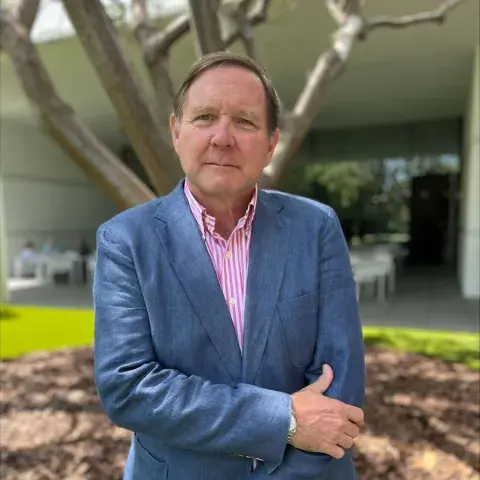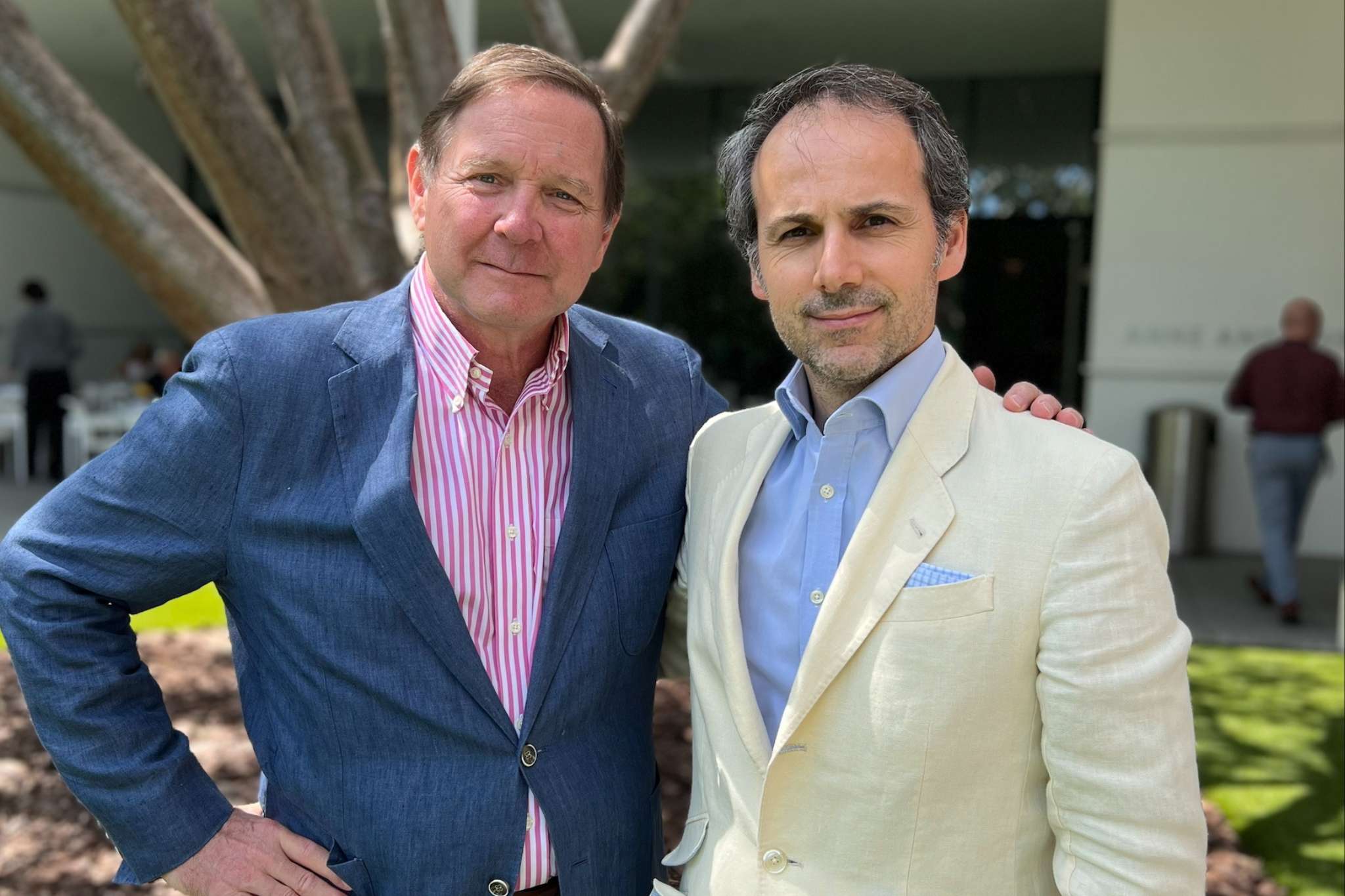
As higher education adapts to an increasingly globalized world, Franklin University Switzerland continues to set itself apart as a leader in international learning. Clotilde Malauzat, Chief Marketing Officer, sat down with Paul Lowerre '77, Chairman of the Board of Trustees, to discuss the university’s evolution, its enduring mission, and the vision that will shape its future.
With over 30 years in the financial sector, Lowerre is currently Senior Vice President - Wealth Management US at UBS, the prominent Swiss bank, with US headquarters in New York. His connection to Switzerland, however, runs far deeper. A member of the class of 1977, Lowerre studied at Franklin during the University’s formative years, an experience that shaped his understanding of global interconnection and cross-cultural engagement. Since joining the Board in 1995, he has played a pivotal role in Franklin’s growth, previously serving as Chair from 2000 to 2010. In 2010, he was awarded an honorary doctorate, and in November 2024, he returned as Chairman of the Board for a second term.
In this conversation, Lowerre reflects on his lifelong connection to Franklin, the University’s unique role in international education, and the path ahead.
- As an alumnus and long-time supporter of Franklin, what makes the University so special to you?
I arrived at Franklin in 1975, and from the moment I stepped onto the campus, I was inspired by the idea that the world itself could be my classroom. It was a feeling that stayed with me and continues to shape me today. At the time, anything felt possible at Franklin. It was a place ahead of its time. I enrolled as a U.S.-based student, largely because a friend was attending. He had learned of Franklin through an encounter with Pascal Tone, one of the founders who was touring the US, raising awareness about this new and unique educational model. Franklin was unlike any other institution—its vision, its diversity, and its commitment to global education stood out – not to mention its incredible location. Franklin is where I met my wife, a fellow alum, and our daughter later graduated also becoming part of this incredible community. 30 years of service to this special institution has enriched my life immeasurably, as I hope it has helped shape the lives of the thousands of students who have followed these many years.
- How has Franklin evolved since your time as a student, and what aspects of its heritage do you believe are most important to preserve? With an increasingly interconnected world, how can Franklin better position itself as a leader in cross-cultural education and global citizenship?
In the 1970s, Franklin was at the forefront of something truly unique—the first genuinely immersive, cross-cultural education. With students, faculty, and administration from around the world gathered in literally the center of Europe, nothing like it existed anywhere else. Each semester, Academic Travel takes students on immersive faculty-led learning experiences around Europe and around the world. This was a true game-changer.
In my fall term, led by the remarkable Prof. Horus Shenouda, our group explored Athens, followed by the narrow streets of Heraklion, and the harbors of Agios Nikolaos in Crete, discovering Minoan culture in one of history’s great crossroads. Ancient Greece came alive to us as Dr Shenouda filled our days with colorful stories of “Zee Cradle of Civilization”. His narration transformed our understanding of the ancient world, and that class— that trip—became a journey through time that I carry with me to this day.
I rumbled through Marshal Tito’s Yugoslavia with Prof. Emeritus Melvin Schlein. We met with government ministers, local high school students, and faculty, and we even visited with the nuns at a working convent. We dug deep into the peacefully co-existent cultures at the intersection of Europe and Asia, giving us a unique perspective on the future disintegration of the nation following Tito’s death. This was learning the Franklin way.
That spirit of learning through firsthand experience—being challenged, inspired, and enriched by diverse perspectives—is something we are committed to fostering at Franklin as we prepare students for an increasingly complex and interconnected world.

- Higher Education is rapidly evolving, with institutions competing on a global scale. How do you see Franklin differentiating itself in this increasingly competitive landscape?
As Chairman, along with the University’s leadership, I am laser-focused on building excellence where it counts. It’s not about chasing a perfect GPA or a formulaic academic model, but rather it’s about attracting students who are driven by curiosity and a hunger to learn actively. We want students who view the world as their classroom and are open to being challenged by diverse ideas, people, and cultures. Our students are tomorrow’s global citizens—people who will pivot in their careers, have meaningful deliberations with varied stakeholders, and remain lifelong learners themselves. That’s the heart of Franklin: an environment where students aren’t just prepared for their next step, but read to challenge the world itself. Not to mention the fact that they get to do it in the incredibly beautiful and welcoming environment that is Ticino.
- How do you see Franklin differentiating itself from other institutions, both within Europe and globally?
The heart and soul of Franklin is its unique environment—a small, tight-knit campus where everyone knows each other by name. There’s something special about the proximity to faculty and the intimacy of the community. This is a place where curiosity is valued, and where you don’t just learn about the world, you engage with it on a personal level. I remember how classmate John Avena and I would mix it up with students from every corner of the globe, learning from their cultures and perspectives. John’s ability to break down barriers and cultivate nascent friendships was incredible! In fact, the fountain at the North Campus is dedicated to his memory, with the exhilarating words of Bruce Springsteen, “Sit Tight, Take Hold, Thunder Road”. Springsteen exhorts us to resist the pull of the ordinary and strive for the new, unknown, and untested world. John embodied this liberating impulse, and his passion for connection influenced the entire campus. He was an amazing Franklin “Brand Ambassador” without even trying to be. But this is the unique spirit I hope every student feels when they choose to come to Franklin.
- What innovative programs or initiatives do you believe could define the next chapter of Franklin’s academic journey?
These are exciting times for Franklin. We are about to announce some groundbreaking academic programs that will further cement our leadership in international education. But it’s not just about new programs—it’s about fostering a mindset. In a world that is ever-changing, cultivating liberal thinkers is more important than ever. At Franklin, we empower our students with a holistic view of the world. They dive into everything from philosophy to socio-politics to mathematics, all while collaborating across departments and disciplines. Collaboration is one of the skills most sought after by employers today, especially in global markets, and Franklin’s environment fosters exactly that: students learning to work together, think critically, and create solutions for tomorrow.
- What advice would you give to current students as they prepare for their professional and personal journeys?
My advice? Franklin students have a double challenge in my view. How to make the most of the campus experience AND to maximize the cultural immersion opportunities all around them in Switzerland, Italy, and the rest of Europe. My advice is to dig in academically, taking every advantage of the remarkable talent and cultural diversity in the classroom - both faculty and students - but also dive into the myriad experiences that are literally everywhere you look. This is the two-fold wonder that is Franklin. I studied Mediterranean Civilization, Russian Lit and Comparative Political Systems, and Art History, but we also had picnics up in the Malcantone, ski trips in the Alps, even a concert by The Who in Zurich. Academic travel brought me to Greece and Crete, as well as Yugoslavia during Tito’s rule. Oh, and a little spring break took me to Qatar and Kuwait City as a guest of my classmates. You’ve only got four short years at Franklin; drink deeply from the educational and experiential firehose it offers!
- Is there anything else you would like the Franklin community to know about you as you step into this role?
This University has shaped who I am today, and I am honored to continue serving it. Franklin will always be home to me, and I cannot wait to be part of its next chapter. I urge every student and alum to reflect on the impact of their experience here, and begin to identify ways to help Franklin continue to grow and thrive for that next generation of student explorers. I very much look forward to meeting all of you when I visit in May to celebrate Franklin’s 55th anniversary. Go Falcons!

